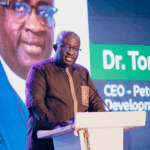
Chief Executive Officer of the Petroleum Hub Development Corporation (PHDC), Dr Toni Aubynn, has described the Petroleum Hub project as a transformative venture that will position Ghana as a major energy and petrochemical hub in Africa.
He said the Petroleum Hub, to be located in Jomoro in the Western Region, was a project whose time had come and one that represented Ghana’s bold and ambitious dream to industrialise and create jobs through energy investments.
“The Petroleum Hub may look like a big dream, but Ghana must have a big dream,” Dr Aubynn said in an exclusive interview with the Ghana News Agency (GNA).
He explained that the government had already earmarked land for the project, which would be developed under a Free Zones model to attract both local and foreign investors.
The government, he said, was acquiring and servicing the land to make it ready for investors interested in setting up refineries, petrochemical plants, tank farms, and port facilities.
Dr Aubynn said investors would enjoy several incentives, including a tax-free period during construction and a 10-year tax holiday to enable them to recoup their investments.
“After that, they will pay only 15 per cent corporate tax as compared to the general 25 per cent, and 35 per cent in the case of mining,” he said.
He explained that the PHDC had initiated an inter-agency dialogue aimed at reducing bureaucratic bottlenecks and cutting down permit acquisition time from over 349 days to just one month.
“At times, investors are discouraged by unnecessary bureaucracies that delay permits. So, the PHDC will be the go-to institution to facilitate and coordinate with all the regulatory bodies to speed up approvals,” Dr Aubynn said.
He stressed that the government’s role was primarily facilitative, adding that “the hub is a private-sector-driven project, with the government only providing the enabling environment.”
The PHDC CEO highlighted that the hub would not only serve as an energy and industrial complex but also develop into a modern city with facilities such as a University of Ghana-grade hospital, hotels, and financial institutions.
Drawing lessons from Malaysia’s experience, where a similar project’s first phase created over 80,000 jobs, Dr Aubynn said Ghana’s Petroleum Hub was expected to directly employ between 500,000 and 800,000 people when fully operational.
“For us at PHDC, our excitement is the job creation potential. This aligns perfectly with President John Dramani Mahama’s 24-hour economy policy and the Big Push agenda to create jobs and stimulate industrial growth,” he said.
He acknowledged the support of the Minister of Energy and Green Transition, Mr John Jinapor, and the Minister of Finance, Dr Ato Forson, for their commitment to ensuring the project’s success.
Dr Aubynn added that the Petroleum Hub project, under the African Continental Free Trade Area (AfCFTA), would also provide customs and trading advantages to investors, facilitating exports within the continent.
He said the PHDC had already begun identifying and training Ghanaians, particularly residents of Jomoro and surrounding communities, to equip them with the skills required for the hub’s operations.
“We have a database of about 600 people who have expressed interest in working within the hub. Our priority is to train and employ people from Jomoro who will be directly affected by the project,” he said, adding that partnerships were underway with local and international universities, including KNUST, Takoradi Technical University, UniMAT, and institutions in Malaysia and Singapore.
Dr Aubynn expressed optimism that when completed within the next decade, the Petroleum Hub would boost Ghana’s economy by over 70 per cent, driven by petrochemical production and exports.
“This project will not only transform Ghana’s energy landscape but also make the country a major exporter of refined petroleum, plastics, and fertilisers within Africa,” he said.



